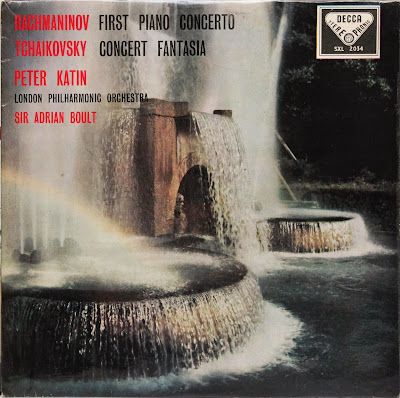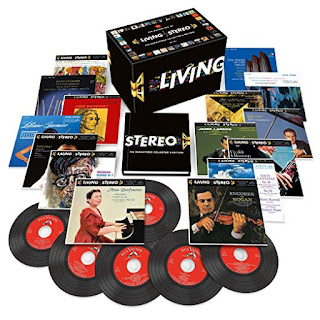Decca SXL 2034: Peter Katin plays Rachmaninov and Tchaikovsky
Rachmaninov: First Piano Concerto
Tchaikovsky: Concert Fantasia
Peter Katin, piano
London Philharmonic Orchestra
Sir Adrian Boult, conductor
Pressing: UK, ED2
Date first published: 1959
Stampers:
Performance: 8/10
Sound: 8/10
Price range: $26-206 (mean $61 on popsike.com)
Comments: This album is a delight. Peter Katin, who is still alive and (presumably) well, gives a beautiful performance of both works. Rachmaninov's first piano concerto seems to always be overshadowed by the beloved second and third, but it should not be underestimated. Having heard more than enough recordings of the more popular concertos, I find the first a breath of fresh air, and this version is no exception to that. This was also my first exposure to Tchaikovsky's Concert Fantasia, and the work sparkled in Katin's hands, who demonstrates both virtuosity and sensitivity. The London Philharmonic under the direction of Sir Adrian Boult very nicely complements the soloist. The sound on this recording is fantastic. The piano is clearly captured with a touch of warmth. Dynamics are excellent, as is the clarity at all frequencies. The soundstage is expansive. Highly recommended.
Addendum 10/12/14:
Here is a link to a download of the Decca Ace of Diamonds reissue of this LP from The Music Parlour:
http://themusicparlour.blogspot.com/2014/01/peter-katin-london-philharmonic-boult.html
Pressing: UK, ED2
Date first published: 1959
Stampers:
Performance: 8/10
Sound: 8/10
Price range: $26-206 (mean $61 on popsike.com)
Comments: This album is a delight. Peter Katin, who is still alive and (presumably) well, gives a beautiful performance of both works. Rachmaninov's first piano concerto seems to always be overshadowed by the beloved second and third, but it should not be underestimated. Having heard more than enough recordings of the more popular concertos, I find the first a breath of fresh air, and this version is no exception to that. This was also my first exposure to Tchaikovsky's Concert Fantasia, and the work sparkled in Katin's hands, who demonstrates both virtuosity and sensitivity. The London Philharmonic under the direction of Sir Adrian Boult very nicely complements the soloist. The sound on this recording is fantastic. The piano is clearly captured with a touch of warmth. Dynamics are excellent, as is the clarity at all frequencies. The soundstage is expansive. Highly recommended.
Addendum 10/12/14:
Here is a link to a download of the Decca Ace of Diamonds reissue of this LP from The Music Parlour:
http://themusicparlour.blogspot.com/2014/01/peter-katin-london-philharmonic-boult.html







Wow. What are the stampers on this one? There is a blue back of this with similar stampers to the Decca (1K/2K) and they are fairly rare, but not too expensive. I'd like to hear that Concert Fantasia. There is the nice LSC-2541 as competition with Janis and Reiner which has caused me to ignore this LP until now.
ReplyDeleteAnd what, Aqlam loves an original Decca pressing and it can be had super cheap on London blueback.
I almost forgot to get a bash in on Moon and his London Blueback guide (actually called Full Frequency Stereophonic Sound, but looks at things through Blueback colored glasses.) First he gives the Blueback version of this a 6 for sound and performance. Pretty much, the performance ratings in the guide are extremely shaky in general. The sound ratings are better, but can be really wide of the mark. This is really an issue with any of these guides including the RCA Bible. If they had a poor copy they will naturally give a poor review. Moon rates this a six and Aqlam says a 5 from our site which is at least the equivalent of a 9. I would recommend our readers also search out the sold prices on Decca SXL and London Blueback. If the Decca is big money, and the Blueback has similar stampers then buy the record even if Moon gives it a 6. Also, complaining aside, I strongly recommend Moon's Full Frequency Stereo Sound (what I call the London Blueback Guide). It is well done with cross references to the Decca SXL and the STS series (sadly not the SDD Ace of Diamonds.)
ReplyDeleteThe Blueback guide is very hit of miss what will be the best version of these Golden Age recordings. Moon alluded to often favoring the later Neumann pressings on Decca and London. I generally don't like these, but if you bump into them for cheap grab them. I commented on Music of Berlioz Decca SXL review on this site that the Neumann narrow band pressings were outstanding and so they can be excellent. The original all tube pressings on SXL and Blueback have the most overall potential and on an all tube system can really take off with the absence of odd order distortion from any solid state devices (unbelievable midrange harmonic clarity.) My second favorite pressings are the grooved wideband ones right after the all tube era or possibly the end of the grooved range for early STS and SDD budget LPs. Generally, they are excellent substitutes for the more expensive titles and sometimes if the original title stinks, these pressings can be a nice leap forward. Unfortunately, I've not gotten to exhaustively digging though these many issues to predict where the best sound might be based on pressing.
Sold mine: uploaded the SDD reissue almost 4 years ago (still available): the matrices of the, almost certainly, 1968 recut were 2W/3W - hence the K's were used for 9+years on SXL. etc - so can hardly be scarce.
ReplyDeleteThe SDD sides are mastered at quite a low level; the almost 29min Tchaikovsky groove ends far-away from the label.
Katin was rather dismissive about Decca's recording-team for a concerti session (not necessarily this) in a BBC Radio 3 message-board comment some 6 years back.
Excellent/technically accomplished playing.
Found his 2007 comment/s (and mine) - the early stereo Mendelssohn's with Collins: message 104.
Deletehttp://www.bbc.co.uk/dna/mbradio3/F7497566?thread=4513972&skip=100&show=20
Thank you, Tin Ear! I've added a link to your digital download on your blog, which I hope readers will appreciate.
DeleteTa for the link -though really should re-dub this due to the later editing; mostly required by the low-level transfer (barely above inherent groove-noise) with earlier laptop speakers missing various 'ticks'.
DeleteUsed a freebie Stanton Collectors Series 100/D98S stylus - but it still sounded quite 'smooth': the SPA reissue likely were more-so judging by the Rach PC1/PC2 SPA..
The BBC thread, above, is an interesting read.
Tin, you let Katin have the last word; should've kept that going.
DeleteSo does this mean Decca not proficient in recording concerti way back when?
Delete